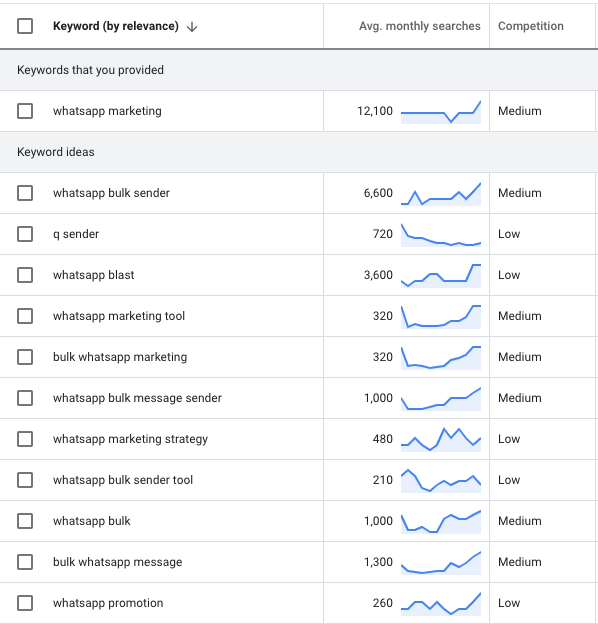

What is keyword research
Keyword research is a process indicating how search engine users search in their market.
Why is keyword research important
Keyword research is the backbone of the SEO strategy, essential to understand how prospects search and prioritise keywords according to volumes and strategic importance. It’s the essential part of the SEO work and typically one of the first tasks in any SEO project. But, still why is it so important?
- Keywords selected in the research will be used to optimise website content. You want to make sure that you select the right keywords as you don’t want to waste time re-optimising content if you selected wrong keywords.
- Selected keywords also inform the link building strategy and you want to make sure you acquire the right links, it’s very difficult to change them once acquired.
- Keyword research will provide you with tons of content ideas, and you’ll need them to monopolise a certain niche if you want to become number 1 for a competitive keyword. Basically, one piece of content won’t be enough to achieve it and you need to understand the whole keyword landscape.
What does the keyword research process involve
- Exploratory phase – brainstorming phase, start by studying the products, services and market to make assumptions about how people could search. Look at competitors and existing keywords that drive traffic to the site, including Paid Search campaigns (particularly the Search Term report can be useful). If you are conducting the research for another company, talk to their employees, sales and marketing staff and product owner. Include any other sources that you might think are useful.
Top tip! Don’t forget to conduct some searches yourself, identify some competitors and look what keywords they used to optimise their content and what they blog about.
Deliverable: initial list of keywords to be further researched
- Data collection & grouping – in this phase the initial keyword list is further extended by the keywords collected from various tools (e.g. Google Keyword Tool) and with volumes added to each search phrase.
Deliverable: a well organised sheet, containing keyword lists, grouped by theme and sorted by volume of monthly searches. This is done for each language and market.
- Shortlist – this is where the keyword strategy is created, from the organised lists some keywords are highlighted and selected for optimisation.
Deliverable: list with selected keywords or highlighted keywords on the grouped sheet
- Keyword mapping – follows the shortlisting stage, but this is outside of the scope of this article and will be covered separately. In short, it’s a process of deciding what keyword to use to optimise a page for, e.g. just like this page is optimised for “What is keyword research”.
Deliverable: Keyword mapping sheet (AKA Keyword strategy), keyword hubs can also be presented as a mind map
How is keyword research presented
Keyword research is typically presented in the form of a spreadsheet with keywords organised in keyword groups. It can also be additionally presented in the form of a mind map. This approach enables the identification of keyword hubs. Such visualisation can create the information architecture for the website and allows to spot new content opportunities.
Keyword research is essential, also for small companies
It’s recommended to conduct keyword research even for small sites and niche industries. This is the best way to avoid surprises and ensure that the optimisation goals are aligned. A well conducted keyword strategy can be valid for years and not only informs the content strategy, but also impacts internal links & link building.
Data sources – keyword research
Search engines have become more and more restrictive about what data they share, mostly they want companies to buy paid ads, therefore you need to use and combine available data sources.
- Google Ads – particularly the search term report shows you exactly what your users searched for, including accurate indication of the volumes and conversion rates. It’s often useful to run a paid search campaign even just to learn about your keywords.
- Google Keyword Tool – it’s made for Google Ads, but still useful to gain a general understanding of search volumes and get new ideas, unfortunately it’s not very useful for long tail searches as it mostly aggregates smaller phrases.
- Wordtracker – good alternative to Google Keyword Tool, made for SEO and will give you individual (not aggregated) keywords and many other features (e.g. YouTube and amazon keywords).
- Google Search Console – awesome source to see what you’re already ranking for, including impressions and positions. Definitely the most accurate source of your current Google positioning.
Top tip! When you analyse search console data consider your existing rankings taking into account the SEO ranking factors and make a note of the pages that rank well. Look out for keywords with high impressions and the ranking between 10-30, this means that the page you own already ranks relatively well, but probably doesn’t get much traffic. This content can normally be pushed to page 1 with little effort and start getting clicks.
What about competitors
Naturally, it’s better to look for niches with less competition and high search volumes. Tools such as Google Keyword Tool will show you an indicator of the competition – it’s an early sign. For the selected keywords I’d still recommend deeper research of competitors to establish if you have a chance to rank and what it will require to rank well.

Understanding keyword hubs – the holy grail of SEO
A keyword hub is a collection of long tail keywords grouped under a major topic.
Keyword hubs are formed on the website by linking content targeting long tail keywords to the main page i.e. hub page. Multiple pages about the same topic are often required to gain a #1 ranking for a competitive keyword. Just like with this article – it’s well linked to other SEO pages on our website with the aim to rank #1 for SEO in Zurich and other competitive search phrases.
Well conducted keyword research should give you a solid understanding of how people search and how keywords can be linked together to create hubs.